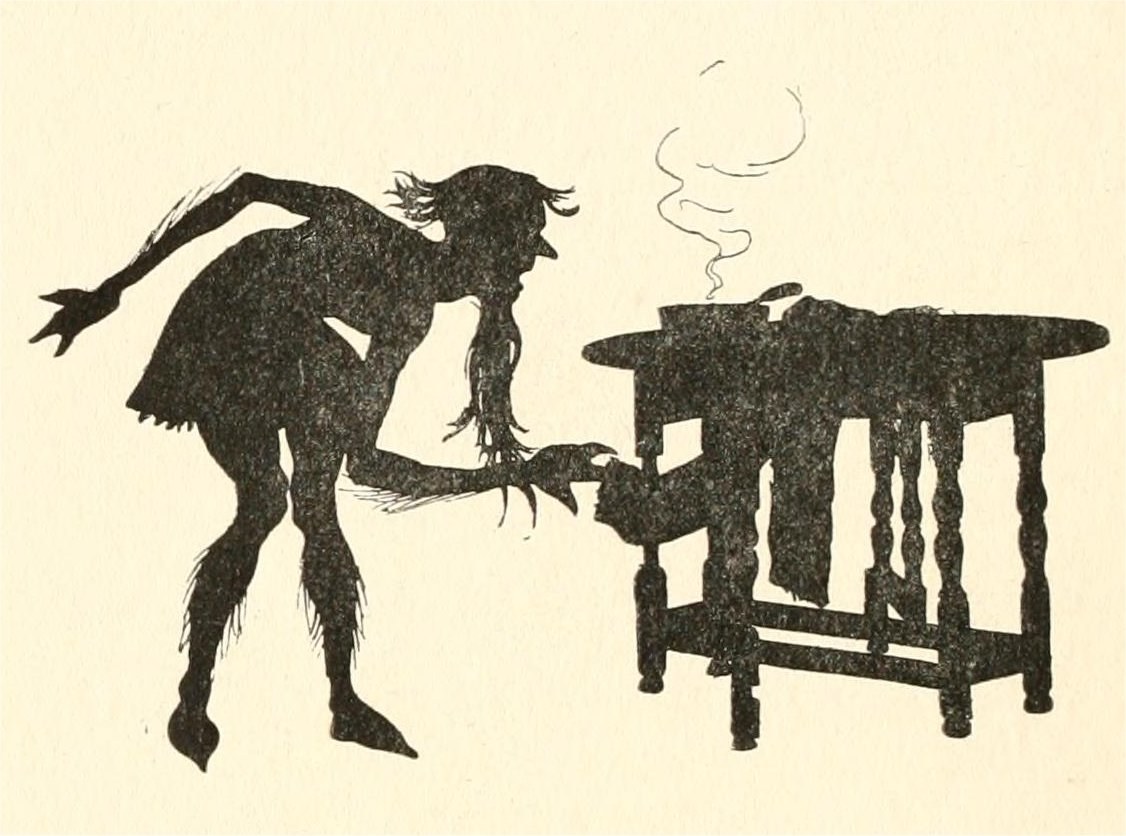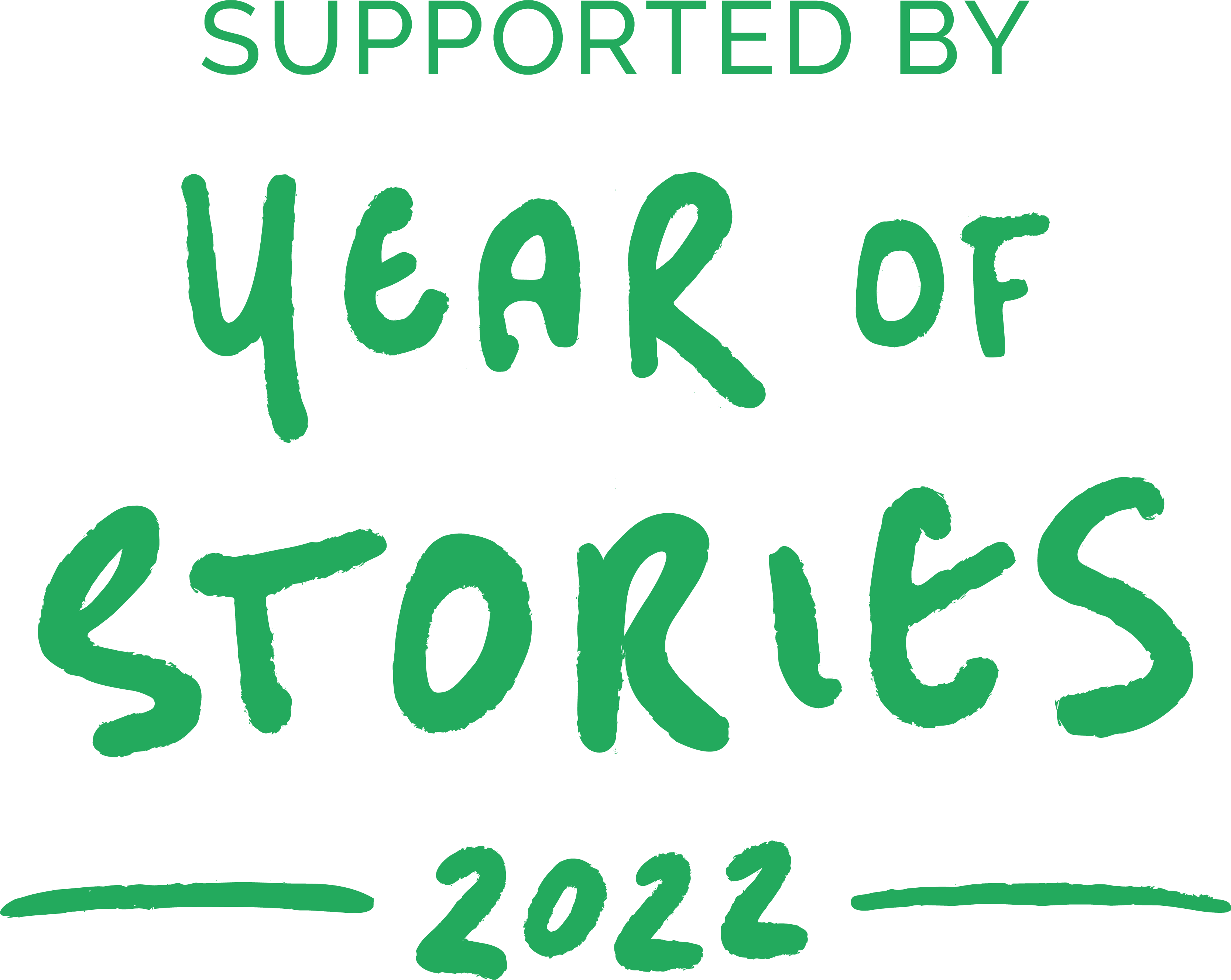
For Scotland's Year of Stories 2022, Wigtown Book Festival commissioned poet Hugh McMillan to write a contemporary version of William Nicholson's famous poem 'The Brownie of Blednoch'. The result is joyful but also a lament for a disappearing language and a way of life
Introduction
Brownies first appear in Scottish literature in the 1510s though they have their origins in the Lares, the Roman spirits of the hearth. Both entities wore rags and were addicted to dairy products. Scottish brownies also had a precise work ethic: they would uncomplainingly perform the most onerous chores in return for nothing but a bowl of milk or cream. They were quick to offend though, and certain things annoyed them very much, such as lack of courtesy, their bowl being put in the wrong place, ministers of religion or being offered payment or clothing. Such affront could quickly lead to the householder having a boggan on his hands, a much more irritating and troublesome lodger.
The Brownie of Blednoch is a 32 verse poem by William Nicholson written in 1828. It’s a wonder of a poem in beautiful rich Scots language and concerns a spirit called Aiken Drum whose appearance scares the life out of everybody in the area but whom the canny villagers of Blednoch use to their profit until some daftie gives him a pair of trousers, whereupon he departs forever back to the ‘lan where we saw nae sky’.
I was commissioned to write a modern version of this epic and it seemed to me the many mysteries and ambiguities of the story would lend itself to reinterpretation even though, or maybe because, the Galloway of William Nicholson is not the Galloway we have today. I wrote 32 verses and followed, pretty scrupulously, Nicholson’s original rhyme scheme. I think, or hope, I have succeeded in exploring some themes that are of interest today such as alienation, greed and a thing I like to call boutique colonisation.
Also the disappearance of Scotland’s native language: ‘A lang time syne oor leids were spaken/whan the bond wi the laund wis still unbraken.’ Scots has disappeared like snow off a dyke, along with the rural working class who spoke it, so most of my poem is in English, though Aiken Drum and a few of the auld heids still speak it here, thrawnly making a point.
If my version entertains it’s good. If folk who like it tune in to the original and wrap their heads around the marvellous and unique combination of story and language that the magician Nicholson created, even better.
Hugh McMillan, Penpont, Burns Night 2022
The Return of the Brownie of Blednoch
In the west is a patchwork of mountain and glens,
a land that birthed doughty women and men,
whose stories are scattered and mostly forgotten
or told in a different tongue,
whose bones are lost in the books of time,
whose songs are stilled though yet the rhymes
echo and sound at evening time,
or when the deer begin to run.
It’s a place now distant from the crowd,
where the sea and sky still meet in cloud,
where the pulse of life isn’t that loud,
that’s the place to come!
Far from disease and other pests,
where the buses ply slowly in arabesques,
where craft ales pour frothy and cheeseboards are best,
there found a new humdrum!
So then, in one starlit inky night,
no fairy or gallowglass in sight,
where camper vans stay overnight,
there we join this song.
One evening in a hamlet not far from the Cree,
where the locals were meeting in some committee,
they threw open the doors and what did they see
bit a bogle baith broukit an glum.
‘My God’, the secretary muttered,
‘What a strange misadventure’, the treasurer uttered,
‘Well I never’, the rep from the wind farms stuttered,
for they never had seen such a one.
The ferlie stuid quait eein the crew,
he’d buin traivelin lang throu the glaur an the gloom,
he wis forfochan an hungert but at least noo,
here he wis, sauf in the toon.
The others were befuddled collecting their thoughts,
how to contact the police or the council or both,
they were fiddling in man bags and handbags to source
a fiver, or some other small sum.
Roland who’d recently read a book about tinkers,
who’d once voted green and was known as a thinker,
said there’s all sorts of agencies designed to give help here,
aid a chap like you to move on.
The brownie stood strecht an his vyce wis douce,
ah am here tae serve ye as ma auld faither used,
whaur an whaurever, ah am strang an leish,
an ma name is Aiken Drum.
The name meant nothing to the friends on the street,
they all made excuses, someone to meet,
they hurried away at a reasonable speed,
leaving the figure of Aiken Drum.
He wannert the closes, the lea o the faulds,
the auld braken mill an the auld braken bields,
aa the doors were snecht ticht, the windaes were sealt,
aa shutten tae Aiken Drum.
The spirit wis foondert an awfie baised,
he kent this locality afore, he realeesed,
twa hunnert years since roon here he wis raised,
the bogle cad Aiken Drum.
An auld bodach cam stotterin oot o his hame,
he hailsed Aiken Drum wi a wave o his airm,
cam in ben the hoose for there’s a rowth tae be duin
aboot here by Aiken Drum.
An the bogle was blythe no just at the darg,
but the leid which he mindit as a wean in the carse,
he felt licht heided in trowth wi this place o haud,
he wis back, wis Aiken Drum.
The auld heid spreid wurd tae his wee band o freends,
an monies the jot or chore that wis cleant
the bogle’s sole perconnon wis taen as gien,
nae hire for Aiken Drum -
but the town was agog with news of the sprite,
his appearance that caused suspicion and fright,
his thick tongue and strangeness that didn’t seem right,
he caused rumours did Aiken Drum.
There was talk he was preying on all the old ones,
pretending to help them while robbing them blind,
there must be some motive someone opined,
there were no wages for Aiken Drum.
The granddaughters of Ina who lived in the Toll house,
arrived in a hurry in a train from the south,
when rumours she was changing her will became rife,
in favour of Aiken Drum.
Old Archie, a bit wandered, was taken into care
when the bogle built a gazebo out of thin air,
where Archie went to drink very strong beer.
He’d begun to have some fun.
The community council when next they met,
took submissions and queries from round the district,
the outrage was palpable the rage was acute:
Who was this Aiken Drum?
Where had he come from at night on the tide?
What did he have in his background to hide?
It made folk uncomfortable seeing him outside,
that bogle Aiken Drum.
They say that he stole chickens and frightened the cats,
spurned their petitions about this and about that,
then came the news that tourist numbers were flat!
Something had to be done!
They cornered him one night close to the square,
they’d taken a collection at the Christmas craft fair
and added half the profits of the bottle stall there,
it was a goodly sum.
They had an elite squad with the local MPs
and Major Andy who’d fought in the east
and with Finn the bookseller who when roused was a beast,
they were a force second to none.
They surrounded the bogle with noise all around,
and saying ‘back where you came from, here’s a few pounds’,
they stuffed in his pocket a pouch full of crowns,
and so the battle was won.
Back whaur Ah cam frae? Why Ah cam frae here,
Ah am your paist an mebbe your futur!
Ah askit for nathin but the richt tae endure,
but ye forbad that tae Aiken Drum.
A lang time syne oor leids were spaken
whan the bond wi the laund wis still unbraken,
the mucklest airmie o the wurld is the forsaken,
an yin o them is Aiken Drum.
Frae Nahr al- Bared tae Kounoungou,
frae Al Weed tae Shamsatoo,
frae Darfur tae Nyaragusu,
we are yer livin shame.
At that the brownie skimmert an wis gaun,
the laist pairt left wis his muckle haun,
drapping the coins tae tummel doon the law,
to whaur the wild sea drummed.
The conspirators wannert cantily awa,
but the feelin hertit felt the daur,
an those that didnae say onythin ava,
are still hauntit by Aiken Drum.
